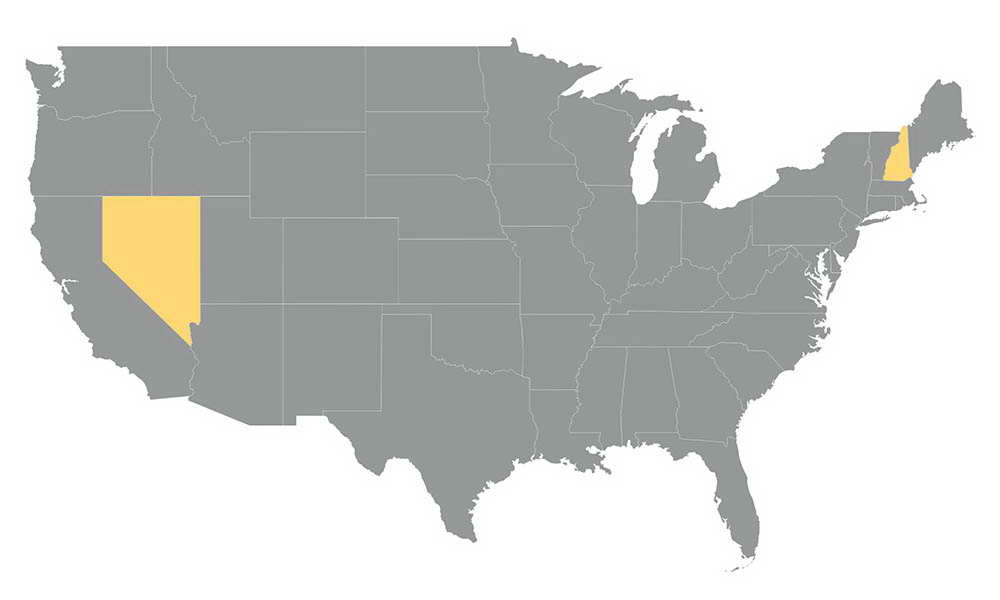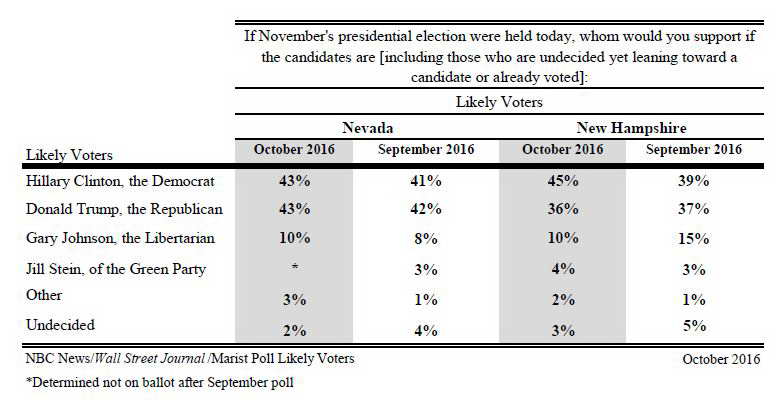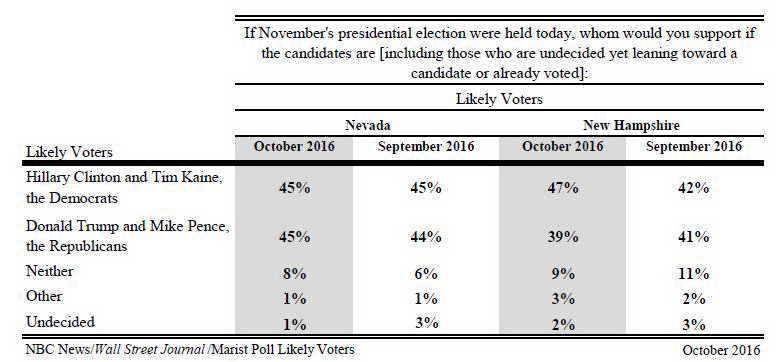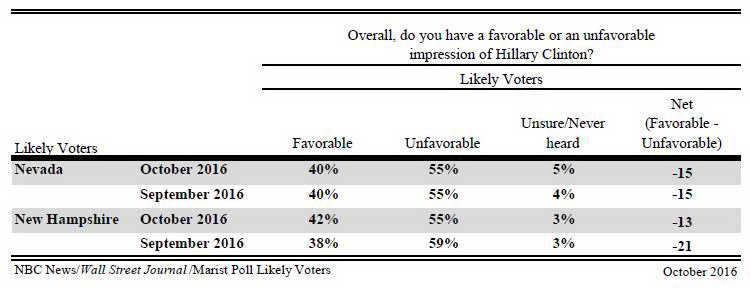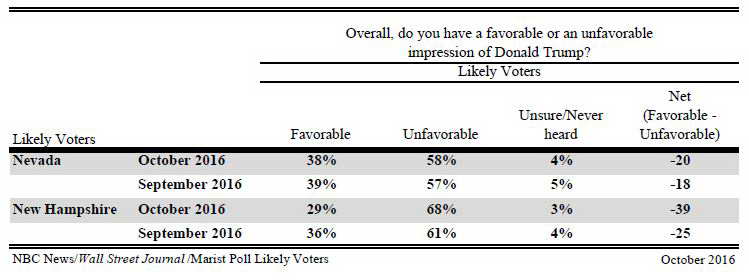October 27, 2016
10/27: Nevada & New Hampshire Last Looks
NBC News/WSJ/Marist Poll
With less than two weeks to go until Election Day, Democrat Hillary Clinton and Republican Donald Trump are tied at 43% among Nevada likely voters including those who are undecided yet leaning toward a candidate or who have already voted. In this multi-candidate field, Libertarian candidate Gary Johnson receives 10%. Three percent support another candidate, and 2% are undecided.
When the NBC News/Wall Street Journal/Marist Poll last reported this question in September, Trump, 42%, and Clinton, 41%, were also closely matched among likely voters statewide. Johnson had the support of 8% to 3% for Stein. One percent, at that time, supported another candidate, and 4% were undecided. Of note, Green Party candidate Jill Stein does not appear on the ballot in Nevada, a decision made after the September NBC News/Wall Street Journal/Marist Poll of the state.
In New Hampshire, Clinton, 45%, has a 9-point advantage over Trump, 36%, among likely voters statewide including those who are undecided yet leaning toward a candidate or who have already voted. 10% support Johnson while 4% are for Stein. Two percent back another candidate, and 3% are undecided.
Clinton has gained traction in New Hampshire. In September’s NBC News/Wall Street Journal/Marist Poll, Clinton, 39%, and Trump, 37%, were competitive among likely voters. 15% backed Johnson, and 3% were for Stein. One percent supported another candidate, and 5% were undecided.
“In Las Vegas terms, the contest for Nevada’s six electoral votes is a ‘push’ right now,” says Dr. Lee M. Miringoff, Director of The Marist College Institute for Public Opinion. “Odds are that Clinton can bank on New Hampshire’s four electoral votes.”
In Nevada, Clinton carries her Democratic base while Trump caries his Republican one. Nearly nine in ten Democratic likely voters, 87%, are for Clinton while the identical proportion of Republican likely voters, 87%, are for Trump. Among independents likely to cast a ballot, 39% support Trump while 33% back Clinton. Nearly one in five, 19%, are for Johnson.
Clinton, 49%, continues to outperform Trump, 37%, by double digits among Nevada women likely to vote. Last month, Clinton had a 15-point advantage among these voters. However, Trump, 49%, maintains his double-digit lead over Clinton, 35%, among men. Trump outpaced Clinton by 17 points previously among men likely to cast a ballot.
Looking at race and education in Nevada, Trump, 53%, is ahead of Clinton, 34%, by 19 points among white likely voters without a college education. This is similar to the 20-point advantage he had in September. Among white likely voters with a college education, Trump and Clinton are competitive, 42% to 41%. In the previous NBC News/Wall Street Journal/Marist Poll, Trump was ahead of Clinton by 6 points among white likely voters with a college education.
In New Hampshire, Trump’s support among his Republican base, 76%, is weaker than Clinton’s support among her party’s faithful, 91%. Seven percent of Republican likely voters support Clinton, and a notable 10% are for Johnson. In contrast, only 2% of Democratic likely voters are for Trump, and 3% back Johnson. Among likely voters in New Hampshire who are independents, Clinton has 39% to 32% for Trump. 15% of independent likely voters support Gary Johnson, and 6% support Stein.
Clinton has widened her lead over Trump among women likely to vote in New Hampshire from 14 points to 25 points now. 54% of women support Clinton to 29% for Trump. Among men likely to vote, Trump, 44%, is up 8 points over Clinton, 36%. However, Trump’s lead among New Hampshire men has declined from 12 points in September when he received 42% to 30% for Clinton.
Among white likely voters in New Hampshire without a college education, Trump and Clinton are competitive, 43% for Trump to 40% for Clinton. Trump’s support among these voters has hemorrhaged since last month when he outdistanced Clinton by 18 points. Among white likely voters with a college education, Clinton maintains her support in New Hampshire where she outpaces Trump by 19 points, 49% to 30%. This is comparable to the 20-point lead she had in the September NBC News/Wall Street Journal/Marist Poll.
Among registered voters in Nevada, Clinton, 43%, and Trump, 41%, are competitive. Johnson has the support of 11%. Three percent support another candidate, and 3% are undecided.
In New Hampshire, Clinton, 44%, leads Trump, 35%, by 9 points among registered voters statewide. Johnson receives 11% while Stein garners 4%. Three percent support someone else, and 4% of registered voters in New Hampshire are undecided.
In the two-way matchup between just Clinton and Trump in Nevada, Clinton and Trump each have 45% of the likely vote. Eight percent do not support either candidate, 1% are for another candidate, and 1% are undecided.
Among likely voters in Nevada with a candidate preference, 72% strongly support their choice of candidate. This is little changed from the proportion of likely voters, 70%, who expressed this level of commitment to their choice of candidate previously. Among likely voters who support Clinton, 71% say they are firmly committed to her, comparable to the 70% of Clinton’s supporters who had this view last month. Among Trump’s backers, 73% say they will not change their minds before Election Day. This is relatively unchanged from 71% last month.
In the head-to-head contest in New Hampshire, Clinton leads Trump, 47% to 39%, among likely voters statewide. Nine percent do not support either Clinton or Trump, and 3% are for another candidate. Two percent are undecided. 68% of likely voters with a candidate preference, similar to 65% in September, say they are firmly committed to their choice of candidate for president. Among Clinton’s backers, 68% say they strongly support their candidate selection, the identical proportion who expressed this level of support previously. 70% of Trump’s supporters, up from 62% last month, say they will not waver in their support for Trump.
Clinton and Trump have high negative ratings in Nevada and New Hampshire. In Nevada, 40% of likely voters statewide have a favorable impression of Clinton while 55% have an unfavorable one, a net negative of 15 points. Clinton’s net negative is unchanged from 15 points in September. Looking at Trump’s favorability in Nevada, 38% of likely voters have a positive opinion of Trump, and 58% have a negative impression of him. Trump’s net negative in the state is 20 points, comparable to 18 points previously.
In New Hampshire, Clinton’s favorable score is 42% among likely voters while her unfavorable rating is 55%. Clinton’s net negative in New Hampshire is 13 points, an improvement from 21 points. Trump fares worse in the Granite State. 29% of likely voters report they have a favorable opinion of Trump, and 68% say they have an unfavorable one. Trump’s net negative score is 39 points, up from the 25-point net negative he received previously.
Looking at the down-ballot races, Republican Joe Heck, 49%, leads Democrat Catherine Cortez Masto, 42%, in the race for U.S. Senate in Nevada among likely voters statewide including those who are undecided yet leaning toward a candidate or who have already voted. Four percent are for another candidate, and 5% are undecided. In September, Heck, 47%, and Cortez Masto, 45%, were competitive. 55% of likely voters with a candidate preference, little changed from September, strongly support their choice of candidate for U.S. Senate.
“One key observation in the U.S. Senate race in Nevada is that Heck outperforms Trump among key groups in the state. Heck does better than Trump among Democrats, independents, and Latinos,” says Dr. Lee M. Miringoff, Director of The Marist College Institute for Public Opinion. “In contrast, Cortez Masto does not outperform Clinton in Nevada.”
In the New Hampshire contest for Senate, Republican incumbent Kelly Ayotte, 48%, and Democrat Maggie Hassan, 47%, are locked in a tight battle among likely voters including those who are undecided yet leaning toward a candidate or who have already voted. Two percent support someone else, and 2% are undecided. Last month, Ayotte, 52%, was ahead of Hassan, 44%, among likely voters statewide.
65% of likely voters with a candidate preference for U.S. Senate in New Hampshire strongly support their choice of candidate, similar to the 64% who said they were firmly committed to their selection in September. The proportion of Hassan’s supporters, 69%, who say they are strongly committed to their choice of candidate is greater than the proportion of Ayotte’s backers, 61%, who express a similar level of support for their candidate. These proportions are little changed from last month.
“Expect the New Hampshire Senate race to attract a lot of attention as both parties vie for a hotly contested seat,” says Dr. Lee M. Miringoff, Director of The Marist College Institute for Public Opinion. “Right now, Ayotte is competitive because she has established separation from Trump and is outpacing him by 12 points.”
In the race for governor in New Hampshire, Democrat Colin Van Ostern, 47%, and Republican Chris Sununu, 46%, are closely matched among the statewide likely electorate. Two percent support another candidate, and 4% are undecided. Among likely voters with a candidate preference for governor, half, 50%, say they strongly support their choice of candidate. 53% of Van Ostern’s backers, compared with 48% of Sununu’s supporters, report a firm level of commitment to their choice of candidate for governor.
President Barack Obama’s job approval rating has improved in Nevada and New Hampshire. 50% of Nevada adults approve of the job President Obama is doing in office while 42% disapprove. Eight percent are unsure. In September, 47% thought highly of how President Obama was doing his job while 43% did not. 10%, at the time, were unsure. Likely voters in Nevada currently divide, 48% to 46%, about how the president is performing his job.
In New Hampshire, a majority of residents statewide, 53%, including 52% of likely voters, approve of how the president is performing in his post. 43% disapprove, and 5% are unsure. Previously, New Hampshire adults divided. 47% approved of the president’s job performance, 46% did not, and 7% were unsure.
Marist Poll Methodology for Nevada
Nature of the Sample for Nevada

